What Happens to Your Website When You Quit Blogging?
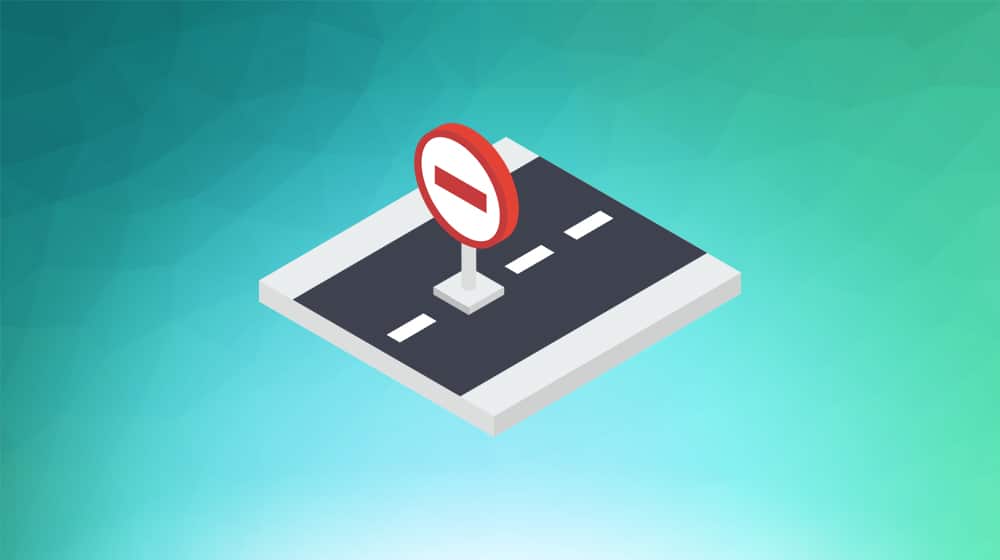
There are millions upon millions of people running blogs on the internet today, and throughout the last four decades, there have been tens of millions more. The internet is positively littered with blogs that didn't make it, blogs that were killed off before their time and are now half-forgotten ghosts, blogs that languish without updates but with their hosting fully paid.
Let's say you're one of those people who started a blog, but you did it more out of obligation than out of any true desire or passion. You were told you needed to make and run a blog, and you did, but that's all you did. You pretty much just did the bare minimum, and sure, maybe it helped out your site for a while, but now you're just tired of it. You're sick of coming up with new blog post topics every week. You're tired of having to spend hours writing. You have better things to do with your time.
Maybe you'd be better off quitting your blog. After all, what does it matter? Your business ran fine before it, you can run fine after it. So what happens to your website when you quit blogging?
You Save Money and Time

The first and most immediate effect of deciding to quit blogging is the savings. If you were spending money on paying writers to write for you, you save that money. If you were paying money for blog research tools, you save that money as soon as you cancel your accounts. Some tools, like link building tools, you might keep around, but your overall budget spent becomes much smaller.
At the same time, you save all of the time you were spending on managing your blog. Time spent communicating with writers, time spent doing keyword research, time spent looking up the competition, time spent writing; it's all time you can now dedicate to something else. You suddenly have plenty of time and money to play with, and you can immediately invest that into other aspects of your business, be it paid advertising, community outreach, product development, a website redesign, or anything else.
This will initially feel good and will make your decision feel like a good choice. And, indeed, perhaps it will be. However, time will tell how it all shakes out.
Your Website Traffic Starts to Drop
Over the first few months, you might not notice much of anything different from your website analytics. You still have a blog, of course, unless you chose to delete your blog when you stopped blogging. That would be a bad idea, though, unless your blog was full of stolen content and spam, but the chances of that are pretty slim.
For roughly the first six months, or maybe the first year, you'll start to notice that your blog traffic drops. It will be minor at first. Google – the source of most of your traffic – gives you leeway. They know sometimes Things Happen, and that businesses may miss a few scheduled blog posts here and there. If they killed off any site that paused their blogging routine for more than one or two cycles, they'd have a lot of shuffling to do with their algorithm.
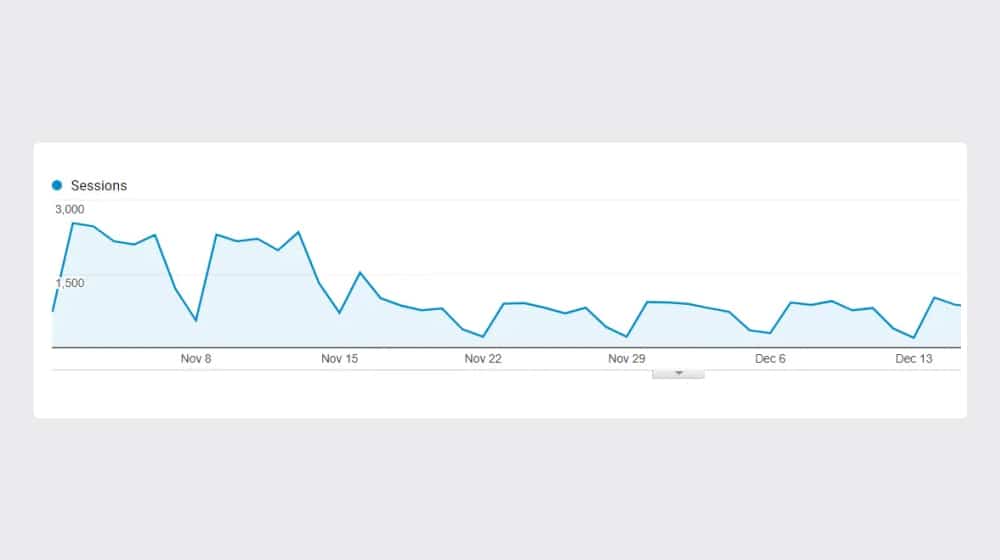
Once it becomes clear that you've abandoned your blog, however, things will start to decline. Google likes sites that are active and constantly publishing new content. When you stop publishing new content, you lose that aspect of SEO value.
There are other reasons why your traffic may drop as well. For example, if you had social media accounts that use something like IFTTT to share new blog posts on Facebook and Twitter when you published them, those social media feeds will also go dark. Any traffic that was coming in from them will also disappear. Unless you're keeping up a campaign of recirculation of old posts, or you're using those accounts for other purposes beyond sharing your content, anyway.
There's also the chance that a major Google algorithm update could hit, which would change the way your site is viewed. If you're not adjusting old content and publishing new content, you won't adapt to those changes, and you'll likely take a hit.
Google doesn't entirely remove old content from their algorithm, of course. Any time you run a Google search, you can find content from the early 2000s, and sometimes even earlier. That said, old content has to be very evergreen to stand the test of time, and the longer it goes, the more chances your competition has to take what you've done and out-do it (one of my favorite strategies) to usurp your place.
You Could Lose Loyal Followers
Another thing that happens when you stop blogging is your loyal followers start to wonder if everything is okay at home. They check your blog and they see nothing new. They check your social media feeds and unless you announced it in advance, they see nothing there either. They might keep subscribing to your feeds or your RSS, but after a while, they'll realize they haven't seen anything from you in a long time. Maybe they'll come back to your site to check and see that you haven't posted.
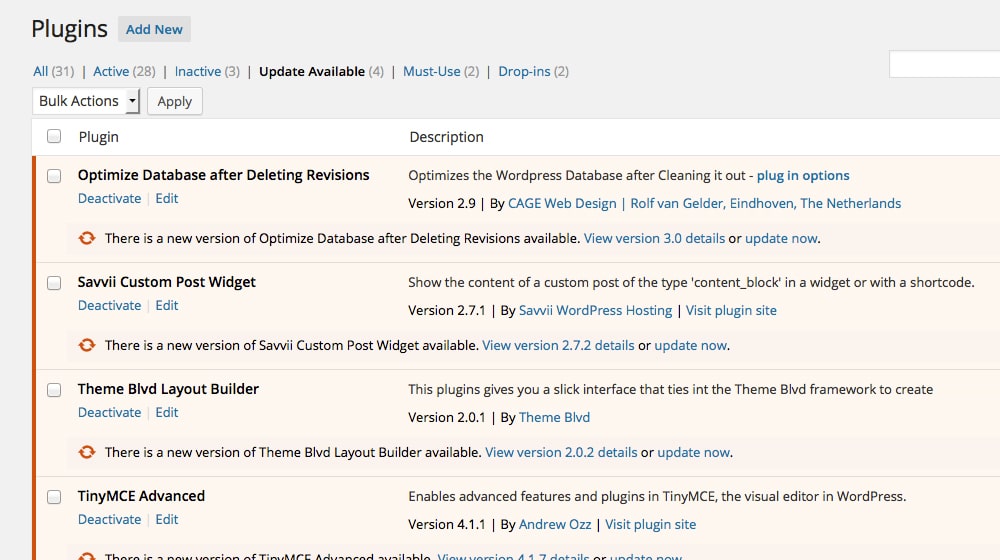
When a blog dies, it's only natural to wonder why it died. Why did you stop blogging? It's often the first sign of monetary troubles. Businesses cancel their blogs because their blogs are spending money they don't deem as valuable, compared to other marketing strategies. That first act of cutting costs often presages further costs, perhaps internal reorganization, or maybe the eventual sale of the company to another business.
This starts to make people wonder whether or not your business is going to be around for the long haul. We often tend to think of businesses as rocks in our lives; trying to imagine life without Coke, without Disney, without Walmart, is almost unthinkable. These companies are too big to fail.
We often forget that the world of small business is a fragile one. Thousands of businesses die every year, failing to make ends meet. People will wonder; is that happening to you? How much longer will you be around? You can assuage some of those fears by keeping your social media accounts active, and by releasing new products and developing new features, but that's not always a sure bet of continuity.
Momentum Continues
At this point, if you're lucky, you may see some continued momentum with your site. Months and even a year or more later, the inertia your blog built up is still going. Your site still pulls in some traffic and some leads, though the raw numbers are probably going down.
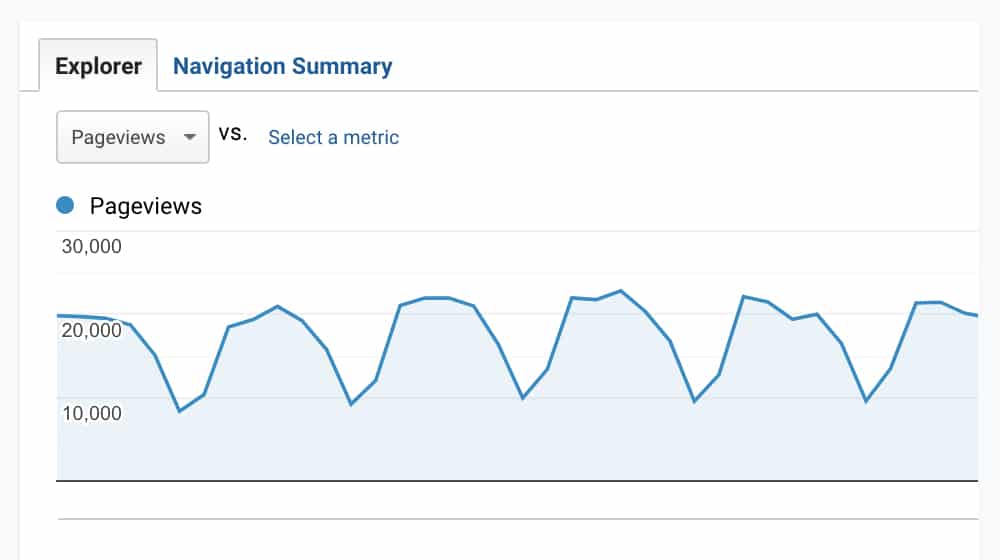
This might be a wake-up call. When people like me talk about the long, slow uphill battle that is building a blog, and how it's all worth it because of how it snowballs and persists, this is what we're talking about. If your blog can persist for this long with no new nudges in the right direction, imagine how much more momentum it could build if you started pushing the rock again.
Even so, you're sticking to your guns. You've been enjoying the extra time you have now that you're not writing, and that extra budget has gone into a brilliant new website design. You're still getting some leads trickling in. It's a win/win situation, as far as you're concerned.
This next one is, well, optional. It depends entirely on whether or not you're still using your social media accounts, and if you've found something else to do with them. See, most people use social media to promote their brand, and the major way they do so is by promoting their blog. Blogs give you a ton of content, and that content is fodder for your social media posts.

Without a blog, you have a lot less to talk about on social media. You can curate content from other brands, but then you're just promoting other companies rather than your own. You can engage with your community, but without something to talk about, a lot of that community will gradually disperse. You can keep up with customer service, and that's fine, but it's not always the core of a good social media strategy.
We create blog content that converts - not just for ourselves, but for our clients, too.
We pick blog topics like hedge funds pick stocks. Then, we create articles that are 10x better to earn the top spot.
Content marketing has two ingredients - content and marketing. We've earned our black belts in both.
What mostly ends up happening is you reduce your social media posting frequency. You use your Twitter for customer service, and you respond to people who message you, but the majority of your posts are news and status updates, and they come less and less frequently. Some people even abandon social media as the next worst thing after a blog eating up their time.
Your Search Engine Rank Starts Falling
Let's say that by now you've been going without your blog for about a year, maybe a year and a half. At this point, you're going to start noticing that your rank in the search engine results pages is falling. Maybe you were at position 1-2 for a lot of your queries before, but now you're around 4-5. Maybe some of your mid-range posts that were in the 5-7 range before are now no longer on the first page, or the last entry before the page ticks over.
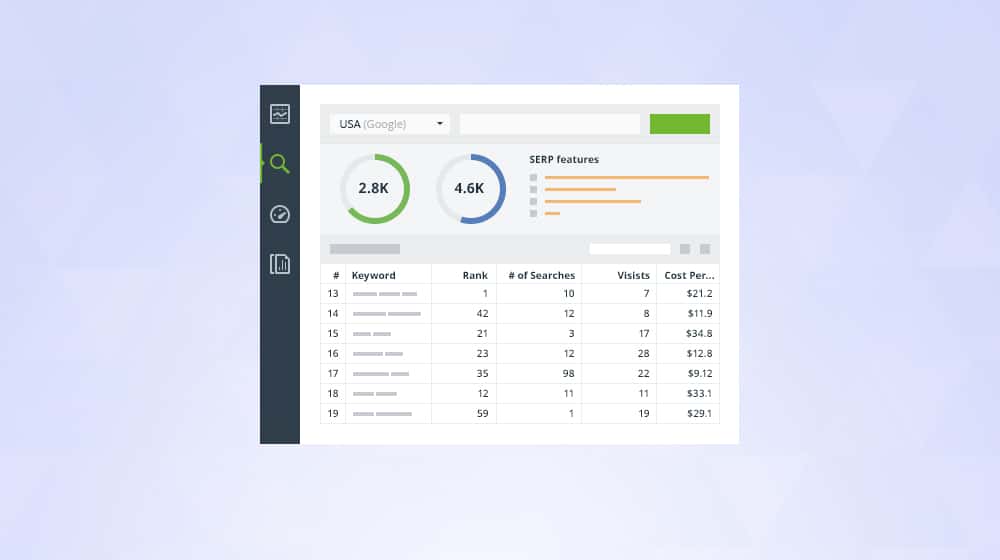
This is the attrition I mentioned before. Some of your posts fall out of date, as changes to your industry or your topic start to wear on them. A "top X of 2019" post is great in 2019, a little less valuable in 2020, and by 2022 people start looking for more modern alternatives. Other posts start to suffer from broken links, as other websites change domains or other businesses fail. If you've ever looked at one of those old top 50 lists from a few years back and noticed how half the links seem to be dead or lead to other companies now, that's what's happening.
Meanwhile, Google's preference for fresh content starts to wear on you. Fresher content that covers the same topics as your old content start to supersede your content in the search results. If your site was kept up to date, you could update your content and push it back up, but you aren't, so you lose ground. Slowly, gradually, and inevitably, your site slips further and further from relevance.
You Start Losing Money on Paid Ads
This is the point where you start to see some potentially disturbing trends. You may look at your PPC records and notice that your costs are starting to climb. There's a reason for that, and it may not be one you want to hear.
One of the primary factors that go into the cost of PPC advertising, in particular through Google Ads, is quality score. Quality score is a metric composed of other metrics, and it's a way Google can estimate how your ads are likely to perform.
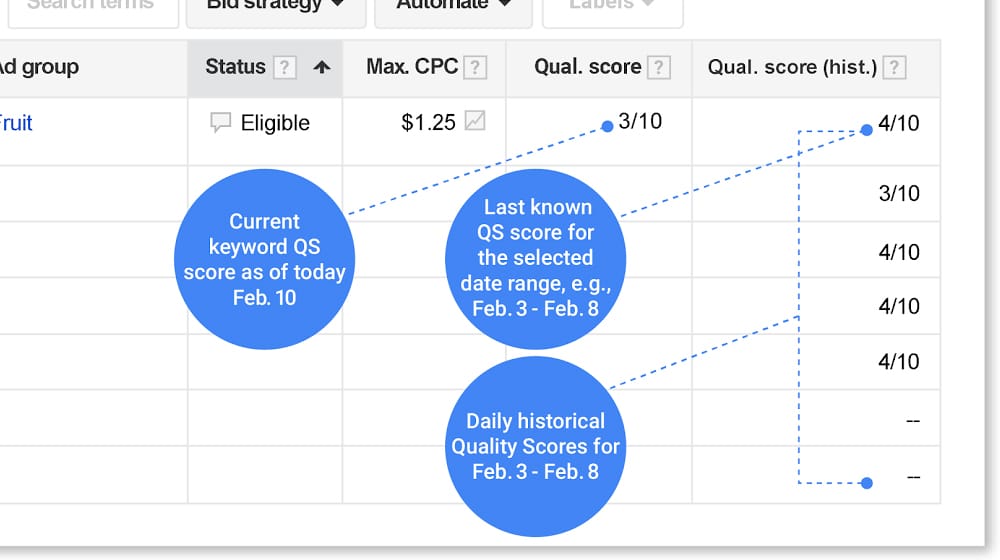
Among the other metrics that are considered with your quality score calculation is the relevance of your site to the queries. This includes both keyword relevance to your ad text and relevance to the queries and keywords involved in the search.
The trouble you're running into is that, as time goes on, keywords and keyword interest changes. What used to be directly targeted on what audiences want, is now out of date and off-center. Your quality score drops, and when it drops, costs rise.
Your Followers Look Elsewhere
By now, the lack of activity on your blog and the potential lack of activity on your social media profiles has made a lot of formerly long-time supporters turn away. You aren't producing anything new, so while they might think of you later when they need something you sell, they might not. They look elsewhere for information, for engagement, and then, eventually, for sales.
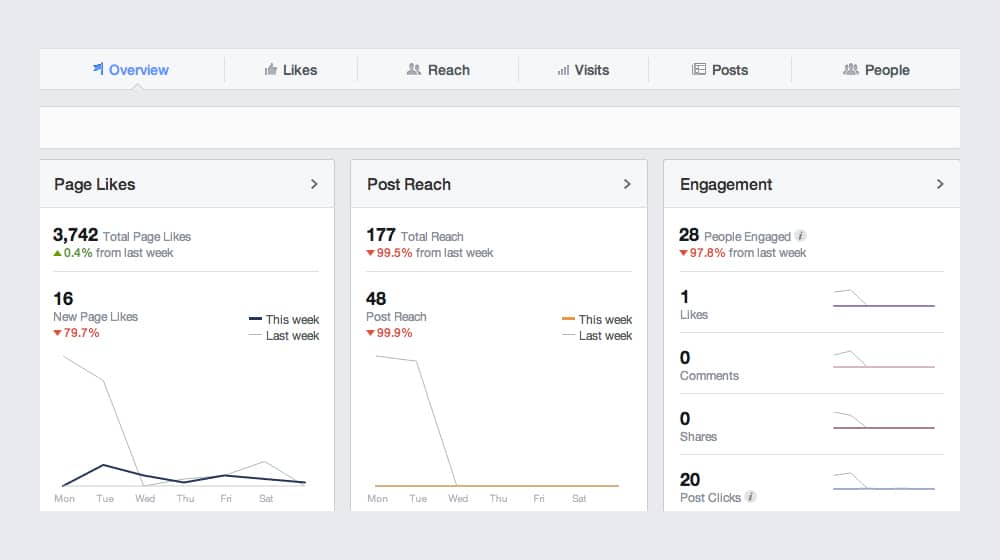
This might not kick into high gear for a year or two after you quit blogging, but sooner or later it's going to happen. There's only so much you can do to attract an audience and keep them around, and if you're not producing content for them, your other strategies aren't going to work as well. Old content isn't attractive even if it's still relevant, and people are going to want more recent sources.
Your Business Dies
Alright, so maybe your business doesn't completely die. It depends on how much of your business relied on ongoing subscriptions and how much relied on new customers. New customers are going to be increasingly difficult to acquire without a lot of marketing expenditure in every arena, and when you're eliminating blogging as one of those channels, you're limiting yourself.
On the other hand, if you're a business where you thrive on new customers and falter when no new customers are coming in, quitting your blog can be very dangerous. It's entirely possible for your business to collapse, especially if another company competes with you and starts up in the same space, with a blog of their own.
Will your business die if you quit posting to your blog? It depends on how heavily you rely on organic traffic for your business to operate. Is it a risk you should be willing to take? That's your call.
Real Reasons You Might Quit Blogging
Now, believe it or not, there are some legitimate reasons why you might want to quit blogging. I'm always of the opinion that a blog is better than no blog, but then, I'm biased. I've made my living for years based on blogs, and now I work quite a bit to help others do the same. Still, I will admit that there are always situations where a blog is not the right choice.
Also, keep in mind that just because you quit your blog now doesn't mean it has to be a permanent decision. You can always start your blog up later when situations change. You may lose a bit of your momentum – or a lot of it – but as long as you don't scrap your site and start over, you still have something there.
You don't have the resources to keep blogging. Blogging is expensive in both time and money, on a balanced scale. You spend a lot of time on it, and you can shorten the amount of time you spend by spending more money, but regardless, a good blog needs a reasonable amount of both.
At some points, you simply run out of one or the other. A few tight months can mean that you don't have a very high budget to pay for your blogging. Alternatively, busy months can mean you have less time to manage the blog. When you don't have the resources to balance the scales, sometimes the blog needs to be the thing to go.

In this case, it's often a good idea to dial back on your blogging, maybe to a post every couple of weeks rather than a couple of posts a week, but it really comes down to the math of your situation.
Your audience hasn't really responded to your blog. Depending on your niche, it's entirely possible that blogging just isn't the right way to reach your customers. Modern Gen Z young adults and the youngest generations still to come are less likely to engage with traditional media. Many of them spend their time on apps like TikTok, streaming sites, and social networks like Snapchat rather than traditional blogs and social networks. If you're trying to reach them, a blog just might not cut it. It can, thus, be worthwhile to investigate other forms of media rather than blogging for your content marketing.
Your blog has declined to the point it's no longer viable. A key part of blogging success is monitoring your metrics. If you've been running your blog off-track or neglecting it, it's possible that it's just simply no longer profitable. If it's not attracting leads, and if it's not ranking in search, and if it's not making you money at the end of the day, what's the point in investing more into it?
Sure, you can figure out what the problem is, fix the problem, and start anew, but that's a lot of work. I don't blame you for cutting your losses for a while and coming back to it later with a fresh face. You might even find that your old blog posts have had time to mature, and decide that blogging is worth it in the end.




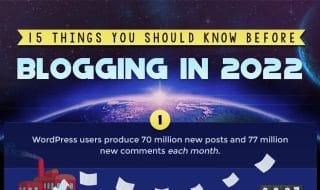

February 20, 2020 at 10:04 pm
Hey James,
Good content here man.
I have seen this happen to many in the industry.
It's one thing to start a blog. It's another thing to blog and maintain your site for years and that's where the weaklings fail.
Successful bloggers keep pushing despite the challenges.
Have a wonderful weekend buddy and good to be here
February 20, 2020 at 10:13 pm
Thanks Enstine! Appreciate the kind words 🙂
December 15, 2020 at 1:22 pm
I am already thinking of closing my blog as I don't have much budget because my business was affected by the pandemic. But reading this, makes me think twice. If I paused the blog for 9mos or less just to give me time to recover my finances, do you think it will take a toll on my business?
December 18, 2020 at 9:23 pm
Hi Tom, I don't think you'll have any issues.
In fact, since most blog posts can take 6-12 months to see progress, you might even see a small increase during that timeframe.
Blogs tend to suffer from stagnation on a longer timeline.
Links break, plugins grow out of date, content becomes outdated, and traffic will start to dip over a long enough timeframe.
If it's less than a year, from my experience, I don't think you will see a drop in traffic.
Hope this helps 🙂
April 03, 2024 at 10:34 am
Hi James,
Due to certain reasons, I was not able to continue with my blogging, and maybe because of that, many of my articles have been removed from Google's ranking.
There were a few articles that were ranking well on Google, but now I cannot find them in Google's results at all. My analytics have dropped to zero. There are no visitors at all on my blog these days.
Question: Could you please let me know if I start writing articles again on the same blog, will it work, or will I have to start with a completely new blog and domain? if I start writing articles from today onwards, will I be able to regain my rankings after some time?
Please, I request your suggestion. Thanks.
April 15, 2024 at 12:40 pm
Hey Jamie!
Yes, if you were to maintain your site again, you would regain rankings after some time.
What happens is search engines start to lose faith after a while that the site is being maintained. Content gets cobwebs on it. This happens with some content faster than others; if you write an article about the iPhone, it will be outated by the year's end, since a new model will already be out.
I would focus on reviewing and updating your old content, too! Start with your content that had the most traffic a year or two ago, and work your way down from there.